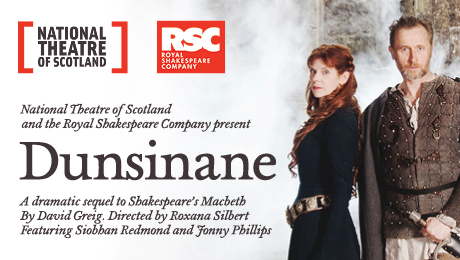In this interview for The Oxford Times David Greig gives more insight to his thought processes at the time he was mulling over the ideas of writing the play.
“After seeing MacBeth in Dundee I realised I knew most of the places mentioned like Burnham Wood and Dunsinane, and that Shakespeare had never been there. So that great Scottish play was written by someone who wasn’t Scottish and hadn’t been to Scotland, yet he reduced the great King Macbeth. Now we know a lot more about him and have realised he was a good king, that interested me into writing a response.The plot follows an English soldiers perspective , a bemused , exposed and as he loses his friends to attrition and exposure to inhospitable elements an increasing confused , baffled observer of his leaders , Siward flailing attempts to impose and set-up a stable regime.
“Plus the Iraq War had just started, which was very much a story of overthrowing a tyrant without preparing for the aftermath and the three things came together very simply. If you’d said it was a follow-up to MacBeth I’d have said ‘what, don’t be ridiculous’ but I realised too late what I’d done and it was terrifying and I nearly had a panic attack. All I could think was ‘what the hell do you think you’re doing’?”
Unlike Shakespeares depiction Macbeth lasted 15-20 years on the throne , at a time when some kings only lasted a few months , a King who would have a fairly large and loyal base that would not accept his overthrow by aid of a massive foreign force , which would have been capable of and willing to fight a long drawn out resistance war against an enemy whose very presence was a major obstacle to peace.
Greig began the play clearly wanting to talk about the present conflicts , to bring to bear peoples knowledge of Afghanistan to help understand 10th century scotland and conversely understand the futility of imposing a political solution with military force over a population that becomes more hostile and entrenched the more force is used by the unwelcome occupier , in this case an English army trying to subdue tribal Scotland by occupation and its parallels with regime change , the question is it possible to impose peace on some other persons behalf ( humanitarian intervention, peacekeepers) is always at the forefront of the audience watching the tension and drama on the stage , is it possible in trying to "make" peace you increase the chances of war and conflict in one that becoming increasingly rhetorical when applied to Afghanistan.
The action brilliantly counterpoints between the elite leaders and the generally bemused soldiers , many of them who would have been about the same age as those we are sending to Afghanistan today.Boys fighting far from home a war he doesnt understand and where the enemy re-defined the terms of the war , simply by being there , constantly being invaded , in being as well as physically , by a ponderous aggressive enemy .
In this video the playwright explains the processes involved in the genesis and evolution of the play from idea to performance.
In the video below the actors discuss their roles during rehearsals , showing a very perceptive knowledge of the metaphors behind the staging.
The play also examines how Siward was told that the mission was would be easy , a tyrant would be deposed and the populace will rejoice and shower the invaders with flowers , it turns out not to be easy , the more they try to control it the more destabilised it becomes.A process that still plays out as certain forces try to get major powers to intervene decisively in conflicts across the Globe.
This review from The Guardian gives a good overview of the work , though the one comment seems to miss the point when complaining the play does not have a strong finish as the whole point is that the scheme peters out as a tragic miscalculated bloody whimper.
"The more the English try to get to grips with this alien land – its awkward geography, its hostile climate, its complex clans and affiliations – the more clumsy their efforts to tame it look. The greater their level of misunderstanding, the more an audience in Scotland finds itself empathising with the occupied nations of the Middle East."

No comments:
Post a Comment